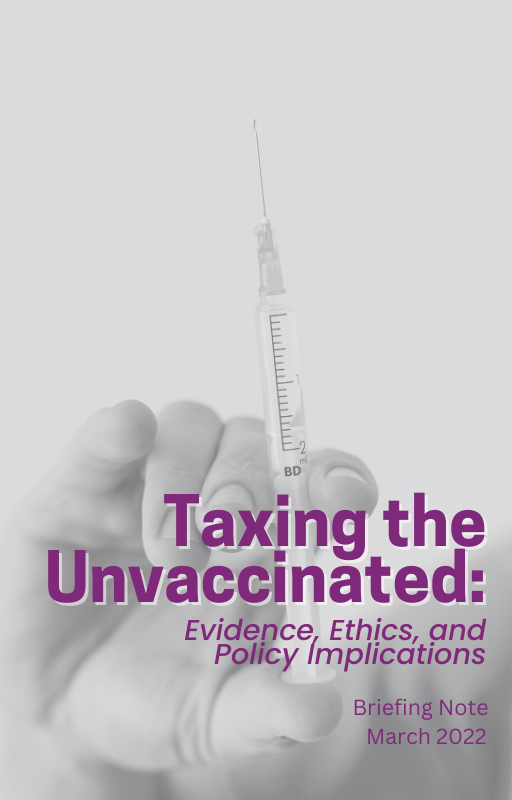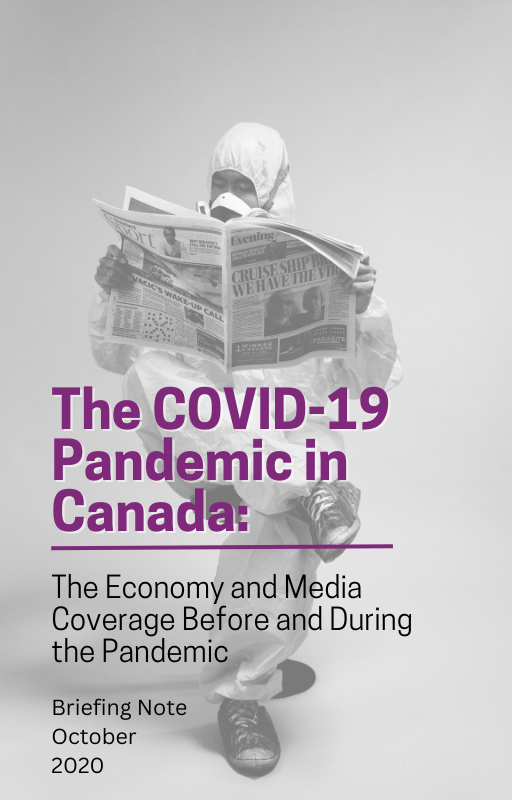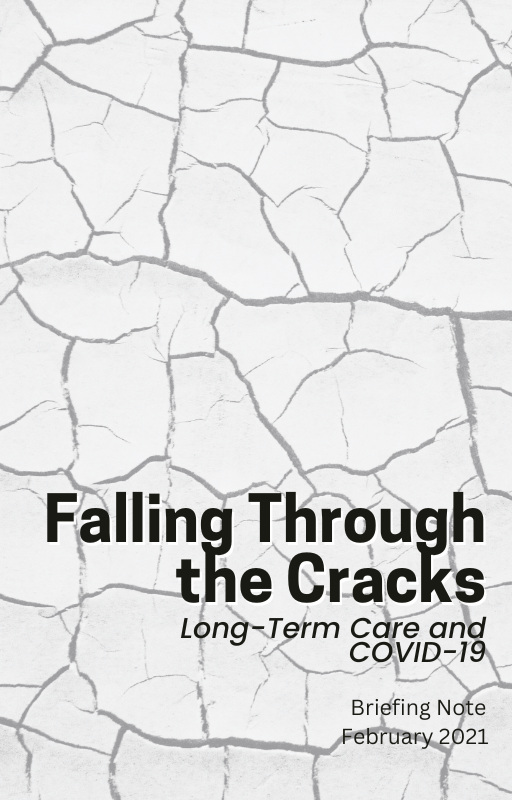COVID‚Äë19 Research
COVID-19 Research
In the early days of the COVID-19 pandemic, the MacEachen Institute began to document and investigate different aspects of the pandemic and its effects on areas of public life. Since 2020, this has resulted in a significant body of work regarding the impact of COVID-19 in various sectors and its implications on policy development.
COVID-19 Research Briefings
Taxing The Unvaccinated: Evidence, Ethics And Policy Implications

Taxing the Unvaccinated: Evidence, Ethics and Policy Implications
On January 28th, 2022, the MacEachen Institute for Public Policy and Governance, in collaboration with the Canadian Center for Vaccinology and the Health Law Institute at –¬º”∆¬¡˘∫œ≤ ø™Ω±÷±≤•, hosted a panel discussion to explore the medical and ethical issues with taxing persons who are unvaccinated for COVID-19. This briefing note summarizes the discussion and key observations made by the panelists.
Click here to watch a recording of the panel.
Ã˝
The COVID-19 Pandemic in Canada: Health Care Issues and Media Coverage Before and During the Pandemic
The COVID-19 Pandemic in Canada: Healthcare Issues and Media Coverage Before and During the Pandemic
This briefing note examines how civil discourse of selected health care issues changed in light of the COVID-19 pandemic. We compare media coverage 6 months prior to the crisis, which includes the time of the Canadian federal election, to 6 months after the onset of the coronavirus. This note also refers to Canadian polling data. Together, media coverage and polling data of selected issues give us an indication of the flavour of civil discourse before and during the pandemic. The note highlights areas of selected interest; it is by no means an exhaustive account.
The COVID-19 Pandemic in Canada: The Economy and Media Coverage Before and During the Pandemic

The COVID-19 Pandemic in Canada: The Economy and Media Coverage Before and During the Pandemic
This briefing note examines how civil discourse of selected economic issues changed in light of the COVID-19 pandemic. We compare media coverage 6 months prior to the crisis, which includes the time of the Canadian federal election, to 6 months after the onset of COVID-19. This note also refers to Canadian polling data. Together, media coverage and polling data of selected issues give us an indication of the flavour of civil discourse before and during the pandemic. The note highlights selected areas of interest; it is by no means an exhaustive account.
The COVID-19 Pandemic in Canada: Environmental Issues and Media Coverage Before and During the Pandemic
The COVID-19 Pandemic in Canada: Environmental Issues and Media Coverage Before and During the Pandemic
This briefing note examines how the emergence of COVID-19 influenced media coverage of selected environmental issues. We compare media coverage six months prior to the crisis, which includes the time of the Canadian federal election, to six months after the onset of COVID-19. This briefing note focuses on selected terms; it is not intended to be an exhaustive account of the issues.
Labour Issues and COVID-19: Roundtable Discussion

Labour Issues and COVID-19: Roundtable Discussion
Recent experiences with Covid-19 have raised legal issues with respect to labour rights and employment law. Covid-19 has changed the workplace and workforce— many people have lost their jobs; many organizations have changed to an online environment.
On March 26, 14 invited participants met online. They included academics as well as representatives of agencies and societies that represent businesses and various sectors in Halifax.Ã˝
The content of the presentations and the issues arising were discussed further by participants. Participants spoke from their professional and personal experience. Their comments are summarized below but not attributed.
Leaders' Roundtable: First Wave
Ã˝
First Wave: Atlantic Canada's Chief Medical Officers Discuss Lessons From COVID‚Äë19
On October 2, 2020, –¬º”∆¬¡˘∫œ≤ ø™Ω±÷±≤•‚Äôs Faculty of Medicine and the MacEachen Institute for Public Policy and Governance (MIPP) hosted a roundtable at which 27 people met online to discuss what went well and what lessons were identified from the health sector‚Äôs response to COVID-19. Participants included senior representatives from the public healthcare systems of both New Brunswick and Nova Scotia, as well as academics. Most of the participants were from Nova Scotia, which was the focus of most of the discussion. This briefing note starts by highlighting selected observations that were drawn from these discussions. The subsequent pages summarize our goals and methods and the discussions that took place at the session.
Click here to view a recording of the panel.
Ã˝
Leaders' Roundtable: Lessons Identified
Ã˝
Lessons Learned from the First Wave or Lessons Merely Identified? Improving Nova Scotia and New Brunswick’s health system for the second wave of COVID-19 and beyond
On December 11, 2020, –¬º”∆¬¡˘∫œ≤ ø™Ω±÷±≤•‚Äôs Faculty of Medicine and the MacEachen Institute for Public Policy and Governance (MIPP) hosted a roundtable at which 28 people met online to discuss lessons from the health sector‚Äôs response to COVID- 19. We chose to distinguish between ‚Äòlessons identified‚Äô and ‚Äòlessons learned‚Äô because we felt that many issues have been recognized as important, but it is less clear that in all, or even some cases, institutional and systems learning have taken place. Some of the challenges are considerable; sustained effort will be required. Participants included senior representatives from both the public health and healthcare systems of New Brunswick and Nova Scotia, as well as academics. Most of the participants were from Nova Scotia, which was the focus of much of the discussion.
Nova Scotia Power and COVID-19
Ã˝
Nova Scotia Power and COVID-19 Observations for Policymakers and Energy Industry Leaders in the age of COVID-19
This briefing note:
- Summarizes Nova Scotia Power’s electricity demand and production for the first two quarters of 2020 (January through June).
- Identifies the sectors hardest hit by the government’s response to COVID-19, and when demand for electricity began to rise.
- Highlights possible energy security impacts of COVID-19 and electricity supply.
- Considers the impact of the decline on Nova Scotia Power’s greenhouse gas emissions obligations.
This briefing note is intended for policymakers who are responsible for energy policy, business and industry leaders wanting to know the impact of COVID-19 on energy use, and members of the public.
COVID-19 and People with Disabilities: Roundtable Discussion
Ã˝
COVID-19 and People with Disabilities: Roundtable Discussion
Past emergency reports and after-the-fact research have noted that persons with disabilities are particularly vulnerable during emergencies. They have specific access and functional needs and can face increased risks and vulnerabilities that are often overlooked in advance of an emergency.
On March 25, 12 invited participants met online. They represented public agencies, non-profit groups that represent persons with disabilities, and academics. Invitations to attend the webinar were sent to partners that collaborated on a funding application the MacEachen Institute submitted to Accessibility Standards Canada in February 2020. Following the presentation, participants discussed the issues raised and their perspective on them from their professional and personal experiences. Their comments are summarized below but not attributed.
Quarantine & Human Rights in COVID- 19: Roundtable Discussion
Ã˝
Quarantine & Human Rights in COVID-19: Roundtable Discussion
Recent experiences with COVID-19 have raised legal issues with respect to quarantine and human rights. Fourteen invited participants met online. They included academics and representatives from agencies and societies that represent businesses and industry sectors in Halifax. Elaine Gibson, Professor of Law at –¬º”∆¬¡˘∫œ≤ ø™Ω±÷±≤•‚Äôs Schulich School of Law provided some historical perspective on quarantine and summarized key terms, actors, legislation and issues that arise from each. Following the presentation, participants discussed the issues raised and their perspective on them from their professional and personal experiences. Their comments are summarized below but not attributed.
The COVID-19 Pandemic in Canada: Social Justice Issues and Media Coverage Before and During the Pandemic
Ã˝
The COVID-19 Pandemic in Canada: Social Justice Issues and Media Coverage Before and During the Pandemic
This briefing note examines how the emergence of COVID-19 influenced media coverage of selected social justice issues. We compare media coverage six months prior to the crisis, which includes the time of the Canadian federal election, to six months after the onset of COVID-19. The note also includes polling data that explores public opinion on racism in Canada. This briefing note focuses on selected terms; it is not intended to be an exhaustive account of the issues.
Falling Through the Cracks: Long-Term Care and Covid-19

Falling Through The Cracks: Long-Term Care And Covid-19
COVID-19 has overwhelmed long-term care (LTC) facilities across the country, leaving Canadian’s shocked by the devastation. LTC facilities account for nearly 11% of COVID-19 cases in Canada and over 70% of total deaths. While the largest proportion of cases in Canada are among those 20-29, nearly 97% of deaths have been among Canadians over the age of 60.
The COVID-19 pandemic has exposed long-standing deficiencies and challenges in the delivery of long-term care in Canada. Many stakeholders are calling for national standards, but there are questions about the best approach. Should we amend the Canada Health Act to include LTC or develop new legislation?
